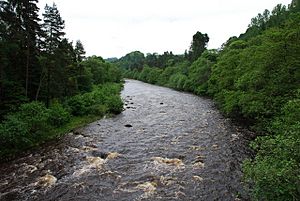Allen Confluence Gravels facts for kids
| Site of Special Scientific Interest | |

River Allen from Cupola bridge showing the northern extent of the SSSI
|
|
| Area of Search | Northumberland |
|---|---|
| Coordinates | 54°55′22″N 2°18′43″W / 54.92284°N 2.31191°W |
| Interest | Biological |
| Area | 4.9 hectares (12 acres) |
| Notification | 1968 |
| Location map | DEFRA MAGIC map |
The Allen Confluence Gravels is a special natural area in Northumberland, England. It is known as a Site of Special Scientific Interest (SSSI). This means it's a protected place because of its amazing nature. It was first listed as special in 1968. This site is famous for its many different kinds of tiny creatures, called invertebrates, that live near the river.
Where is This Special Place?
The Allen Confluence Gravels site is in the north-east of England. It's found where two rivers, the River West Allen and the River East Allen, join together. After they meet, they form the River Allen. This spot is about 3 miles (4.8 km) north-west of a village called Allendale.
What Makes This Place Special?
This area is very important because it has many different types of habitats for river-edge invertebrates. A habitat is a natural home for animals and plants. Here, you can find different kinds of land:
- Areas with firm sand and small stones (shingle) that don't flood often.
- Areas with loose sand and shingle banks that flood regularly.
- Wet woodlands with lots of moisture.
These different areas help many unique creatures live and grow.
Amazing Animals You Can Find Here
The Allen Confluence Gravels is home to many interesting insects and spiders. These tiny creatures are a big reason why the site is protected.
Tiny Beetles and Spiders
You can find some rare ground beetles here. For example, Bembidion schueppeli and B. litorale like to live on sandy banks that have some plants growing on them. Another type of beetle, the water beetle Helophorus arvernicus, lives in the muddy parts of the river's edge.
On flatter parts of the site, you might spot the ground beetle Clivina collaris. Also, a tiny spider called Caviphantes saxetorum, sometimes called a money spider, hides under stones. Higher up on the sandy banks, you can find Aegalia sabuleti, which is a small type of chafer. Another money spider, Diplocephalus protuberans, also lives here.
Shingle Dwellers
The areas with shingle (small stones) are home to even more creatures. These include ground beetles like Bembidion monticola and B. stomoides. You might also see Fleutiauxellus maritimus, a small click beetle. A large wolf spider called Arctosa cinerea lives here too. One very special money spider, Diplocephalus connatus, is found in Britain only at this site and one other place in the north-east.
Moths and Other Creatures
The damp woodland areas at Allen Confluence Gravels support some uncommon moths. These include the yellow-tarred brindle (Acasis viretata), the black rustic (Aporophyla nigra), and the plain wave moth (Idaea straminata).
A special ground beetle, Pterostichus cristatus, is also found here. It only lives in Northumberland and Durham. The woodland is also home to several rare spiders, such as Centromerus persimilis.
What About the Plants?
One interesting plant found at the site is alpine penny-cress (Thlaspi alpestre). This plant can grow in soil that has high levels of certain metals. Its presence here suggests that the river might have some metal pollution. This pollution likely comes from old mineral mines in the area where the river starts.
Keeping the Site Healthy
In 2010, experts checked the Allen Confluence Gravels site and said it was in good condition. However, they were a bit worried about a plant called Himalayan balsam (Impatiens glandulifera). This plant is not native to the area and can grow very fast. It can take over space from native plants, which is not good for the local wildlife. Efforts are made to control this plant to keep the site healthy for all its special creatures.
 | Claudette Colvin |
 | Myrlie Evers-Williams |
 | Alberta Odell Jones |

